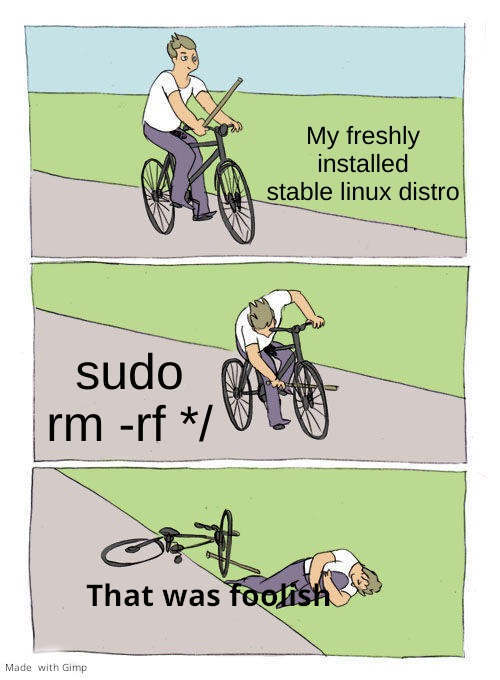this post was submitted on 11 Nov 2023
243 points (84.0% liked)
linuxmemes
21637 readers
344 users here now
Hint: :q!
Sister communities:
Community rules (click to expand)
1. Follow the site-wide rules
- Instance-wide TOS: https://legal.lemmy.world/tos/
- Lemmy code of conduct: https://join-lemmy.org/docs/code_of_conduct.html
2. Be civil
- Understand the difference between a joke and an insult.
- Do not harrass or attack members of the community for any reason.
- Leave remarks of "peasantry" to the PCMR community. If you dislike an OS/service/application, attack the thing you dislike, not the individuals who use it. Some people may not have a choice.
- Bigotry will not be tolerated.
- These rules are somewhat loosened when the subject is a public figure. Still, do not attack their person or incite harrassment.
3. Post Linux-related content
- Including Unix and BSD.
- Non-Linux content is acceptable as long as it makes a reference to Linux. For example, the poorly made mockery of
sudoin Windows. - No porn. Even if you watch it on a Linux machine.
4. No recent reposts
- Everybody uses Arch btw, can't quit Vim, and wants to interject for a moment. You can stop now.
Please report posts and comments that break these rules!
Important: never execute code or follow advice that you don't understand or can't verify, especially here. The word of the day is credibility. This is a meme community -- even the most helpful comments might just be shitposts that can damage your system. Be aware, be smart, don't fork-bomb your computer.
founded 2 years ago
MODERATORS
you are viewing a single comment's thread
view the rest of the comments
view the rest of the comments

Not in this case. It's
*/here so it expands to directories at current location. I'm sure that's a typo thoughI'm not brave enough to test it on my distro, so I'll take your word on that lol
You can do
echo */andecho /*to see how they expand. Alsorm -rf /already is enough without the*as it already is recursive*is there to bypass the need for--no-preserve-rootrm -rf /needs--no-preserve-rooton GNU coreutils, I think.yes
why do they even have that lever
Originally,
rmwould merrily nuke your whole filesystem if you told it to. At some point, someone thought that was a pretty stupid default behaviour, so they added that flag to change the default to not nuke your entire filesystem. However, they made the change backwards compatible in case someone still needed the old behaviour. I can imagine in a container or throwaway environment, it might be vaguely reasonable to expect to be able the blat/.See also:
I'm aware of how recursive force remove works. I'm just kidding around.
Anybody brave enough to tell the MS rep this on patch night??
(You have backups, right?)